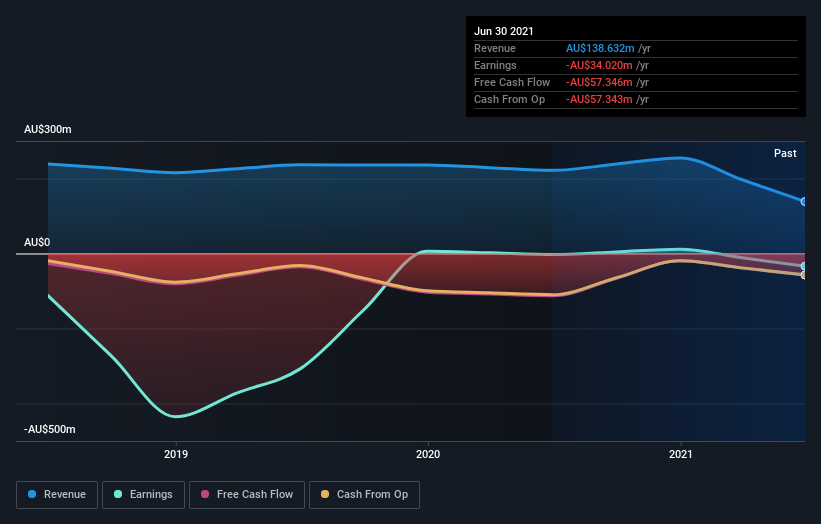Energy Resources of Australia (ASX:ERA shareholders incur further losses as stock declines 5.3% this week, taking five-year losses to 33%
Energy Resources of Australia Ltd (ASX:ERA) shareholders should be happy to see the share price up 11% in the last month. But over the last half decade, the stock has not performed well. After all, the share price is down 51% in that time, significantly under-performing the market.
Given the past week has been tough on shareholders, let's investigate the fundamentals and see what we can learn.
Check out our latest analysis for Energy Resources of Australia
Given that Energy Resources of Australia didn't make a profit in the last twelve months, we'll focus on revenue growth to form a quick view of its business development. When a company doesn't make profits, we'd generally expect to see good revenue growth. Some companies are willing to postpone profitability to grow revenue faster, but in that case one does expect good top-line growth.
In the last five years Energy Resources of Australia saw its revenue shrink by 9.2% per year. That's definitely a weaker result than most pre-profit companies report. Arguably, the market has responded appropriately to this business performance by sending the share price down 9% (annualized) in the same time period. It's fair to say most investors don't like to invest in loss making companies with falling revenue. This looks like a really risky stock to buy, at a glance.
The company's revenue and earnings (over time) are depicted in the image below (click to see the exact numbers).
Take a more thorough look at Energy Resources of Australia's financial health with this free report on its balance sheet.
What about the Total Shareholder Return (TSR)?
We've already covered Energy Resources of Australia's share price action, but we should also mention its total shareholder return (TSR). The TSR is a return calculation that accounts for the value of cash dividends (assuming that any dividend received was reinvested) and the calculated value of any discounted capital raisings and spin-offs. Energy Resources of Australia's TSR of was a loss of 33% for the 5 years. That wasn't as bad as its share price return, because it has paid dividends.
A Different Perspective
We're pleased to report that Energy Resources of Australia shareholders have received a total shareholder return of 44% over one year. There's no doubt those recent returns are much better than the TSR loss of 6% per year over five years. We generally put more weight on the long term performance over the short term, but the recent improvement could hint at a (positive) inflection point within the business. Shareholders might want to examine this detailed historical graph of past earnings, revenue and cash flow.
Of course Energy Resources of Australia may not be the best stock to buy. So you may wish to see this free collection of growth stocks.
Please note, the market returns quoted in this article reflect the market weighted average returns of stocks that currently trade on AU exchanges.
Have feedback on this article? Concerned about the content? Get in touch with us directly. Alternatively, email editorial-team (at) simplywallst.com.
This article by Simply Wall St is general in nature. We provide commentary based on historical data and analyst forecasts only using an unbiased methodology and our articles are not intended to be financial advice. It does not constitute a recommendation to buy or sell any stock, and does not take account of your objectives, or your financial situation. We aim to bring you long-term focused analysis driven by fundamental data. Note that our analysis may not factor in the latest price-sensitive company announcements or qualitative material. Simply Wall St has no position in any stocks mentioned.

 Yahoo Finance
Yahoo Finance 
